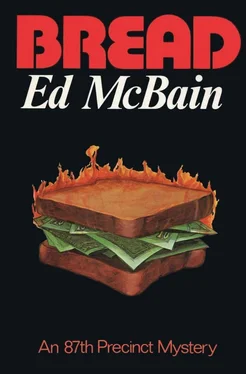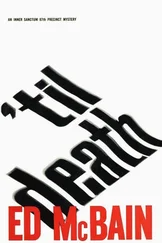A million dollars, Carella thought. For buying and selling little wooden animals. When he got home tonight, he would tell his nine-year-old son Mark that there was no percentage in the crime biz, not on the cop side of it and certainly not on the crook side of it. The thing to get into, he would say, is the little wooden animals. That’s where the future lies, son. Little wooden animals. And April, Mark’s twin sister, would listen wide-eyed, wondering whether Carella was joking, and wondering why she had not been advised to undertake a similar professional pursuit. Was it possible her father was a male chauvinist pig? (Or as she was wont to pronounce it, after having heard the expression on television, “a male show-business pig”). Teddy, the mother of his children, his wife, would listen by watching, her eyes never leaving his lips, a secret, silent, amused expression on her face. And then perhaps she would answer with her hands, using the deaf-mute language her entire family understood, and she would tell the children that their father was joking, the future was not in little wooden animals, it was instead in compressed garbage, which she had read could be made virtually indestructible after treatment with radioactive isotopes, and could then be sawed, planed, molded, hammered, and used for all sorts of things. The only problem was how to get rid of the indestructible things made from this specially treated waste. Garbage, she would tell them. Wooden animals, he would insist.
Smiling, he went to the files.
Cotton Hawes, who was a bachelor, had no children (that he knew of) to advise on future career possibilities. His own father, who had proudly named him after Cotton Mather, the Puritan priest, had once told Hawes that the only god worth serving was God Himself. Hawes had pondered this for a long time. He had pondered it all through adolescence, when the only god worth serving seemed to be hidden somewhere beneath the skirts of every high school girl who wandered tantalizingly into his field of vision. He had pondered it during his hitch in the Navy, when the only god worth serving seemed to be survival, a not always certain prospect aboard a PT boat. And he had pondered it when he joined the police force, where the god was justice (he thought at first) and where the god later became retribution (until he learned otherwise) and where the god after his transfer to the 87th seemed embodied in the person of Steve Carella (who he later learned was only a mere mortal, like himself). He was no longer a boy listening to his father, a good and decent man (although a bit of a fanatic when it came to religion), advising him on how to live his life. He had, in fact, needed no better advice than the example his father had set simply by being what he was. Hawes tried to be a good and decent man. He didn’t know whether he was or not, but that’s what he tried to be.
He did not get back from his evening and night with Christine Maxwell, whom he had met many years ago while investigating a multiple murder in a bookshop, until 3:00 A.M. He called his answering service, and learned that Steve Carella had phoned while he was out and left a message for him to return the call no matter what time it was. He immediately dialed Carella’s home in Riverhead.
“Hello?” Carella said. His voice was edged with sleep.
“Steve, this is Cotton. I’m sorry I woke you, but your message said...”
“Yeah, that’s all right,” Carella said. He was coming awake. He paused for a moment, and then said, “Roger Grimm called the squadroom at a little past midnight. Meyer took the call.”
“What’s up?” Hawes asked.
“While he was out tonight, somebody burned his house to the ground. I’m going over to take a look at the warehouse tomorrow. How’d you like to drive up to Logan and see what they did to his house?”
“Sure thing, Steve. What time do you want me there?”
“Ten o’clock too early?”
“No, no, fine,” Hawes said, and looked at the clock and sighed.
On the drive out to the suburb of Logan the next morning, it occurred to Hawes that Roger Grimm might have set fire to his own house, in order to collect the insurance money on it, in order to obtain some ready cash, in order to release at least part of the cargo of wooden doodads he was expecting from Germany. He arrived in Logan at 10:15, and one look at the house, even in its gutted condition, convinced him that insurance fraud was a definite possibility. Set on a half-acre of rolling ground in an area of luxurious estates, the house alone must have been worth at least a quarter of a million dollars before the fire.
In its present condition, it was worth zilch. Whoever had set the blaze had done an expert job. Even though the Fire Department had responded within minutes, the house was almost totally consumed by the time they got there, and they’d been more concerned with rescuing the rest of the neighborhood than they’d been with salvaging Grimm’s house. In a particularly dry August, they had not wanted an uncontrollable conflagration on their hands. They’d done a good job wetting down rooftops and shrubbery, containing the blaze, so that the only thing reduced to ashes was Grimm’s place Hawes parked his convertible Pontiac, and then walked up the oval driveway to the still-smoldering ruin. Grimm was standing on the flagstone entry porch before the charred posts and lintel of what had once been the front door. He was wearing white slacks and a dark blue, short-sleeved sports shirt. His hands were in his back pockets, and he was staring through the doorless frame as though hoping to find some semblance of a house beyond it. He heard Hawes’s approach and turned suddenly. There was a pained and distant look on his face.
“Oh, hello,” he said.
“Was it insured?” Hawes asked.
“What? Oh. Yes. Yes, it was insured.”
“For how much?”
“Three hundred thousand.” He turned to look at the rubble again. “I put a lot of work into this place,” he said. “This isn’t like the warehouse. The warehouse was only money, a lot of wooden crap that represented money. This is different. This was where I lived.”
“When did it happen?”
“Fire Department clocked the call at eleven-twenty.”
“Who phoned them?”
“The man next door. He was getting ready for bed and he looked out from an upstairs window and saw the flames. He called the Fire Department right away.”
“What’s his name?”
“George Aronowitz.”
“Well, let’s take a look around,” Hawes said.
“No,” Grimm said, and shook his head. “No, I don’t want to. I’ll wait for you here.”
A burglarized apartment is a violation of self, and there is nothing quite so pathetic as the look on the face of a burglary victim. He stands in the midst of an invasion of privacy, clothing scattered, personal belongings treated with indignity and haste, and he is reduced to helpless rage and childlike dependency. A sense of vulnerability, frailty, even, yes, mortality bounces from the walls of his invaded castle, and he feels in that moment that he himself, his person, is no longer safe from the wanton, willful violation of total strangers. Murder, of course, is the ultimate theft. It robs a man not only of his possessions but of his very life. Arson runs a close second.
There is undisputed excitement in watching a roaring blaze, perhaps a throwback to those days when Neanderthal struck flint against tinder and leaped back in surprise at what he had miraculously wrought. Or perhaps it is something deeper, something evil and dark that causes man to respond to a fire raging uncontrolled, something that echoes his own inner desire for the same sort of violent, irrepressible freedom — oh, to be able to challenge and defy, to roar rebellion and command complete and awed attention, to terrorize spectacularly, to rule with undisputed power, and finally to triumph! It’s not surprising that some firebugs will watch their handiwork in total ecstasy, erections bulging in their trousers, ejaculations dampening their own hot passions when hoses fail to quench the rampaging flames. There is excitement in a fire, and the naked ape responds generically. There is no excitement in the aftermath. A fireman does not fight a fire, he fights the thing that is on fire. He drenches it with water, he sprays it with carbon dioxide, he hacks at it with an ax, he does all he can to destroy the thing because the fire is only a parasite feasting on the thing, and if he can kill the thing, he can kill the fire. There were a lot of dead things in the rubble of Roger Grimm’s home. They lay in sodden steaming chaos like dismembered corpses on a battlefield, partial reminders of what they must have been when they possessed lives of their own.
Читать дальше









